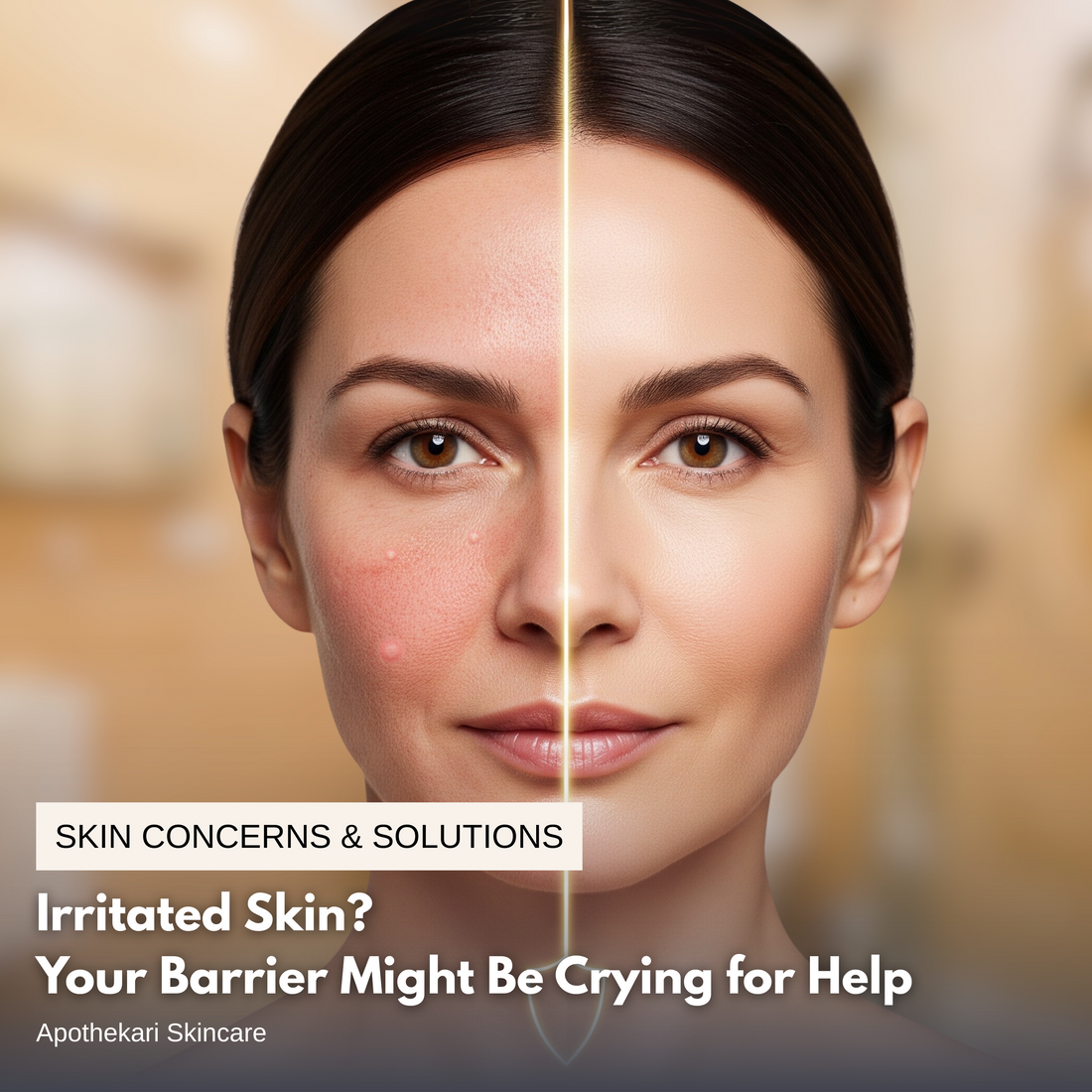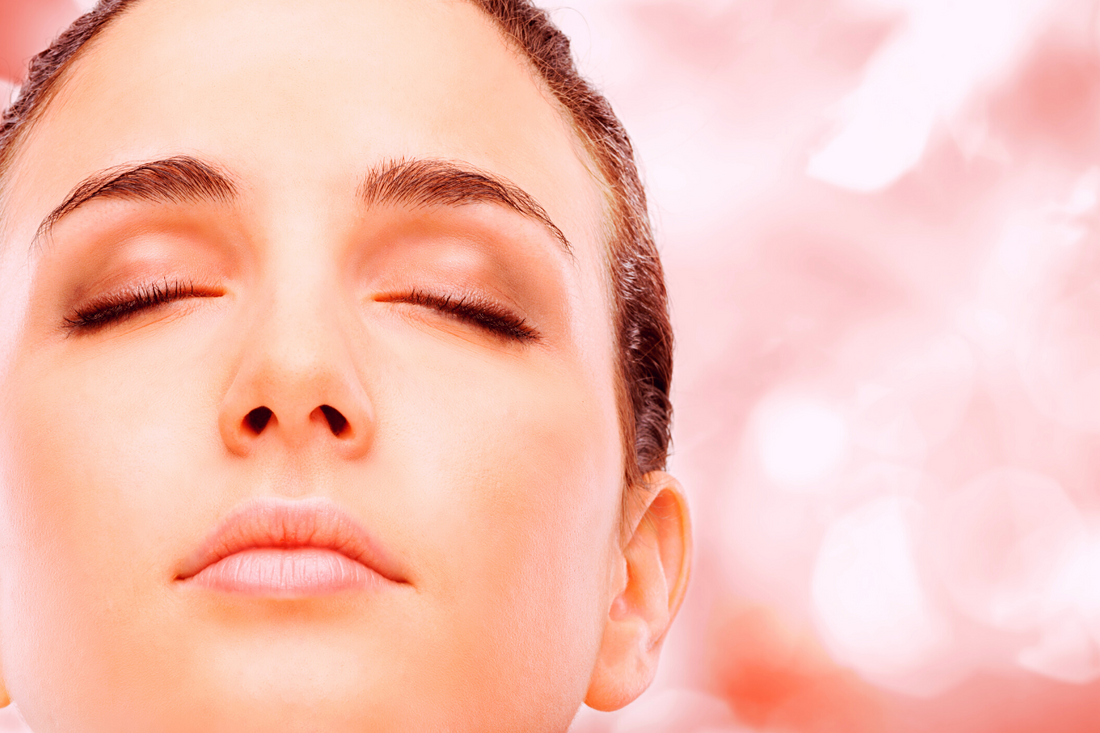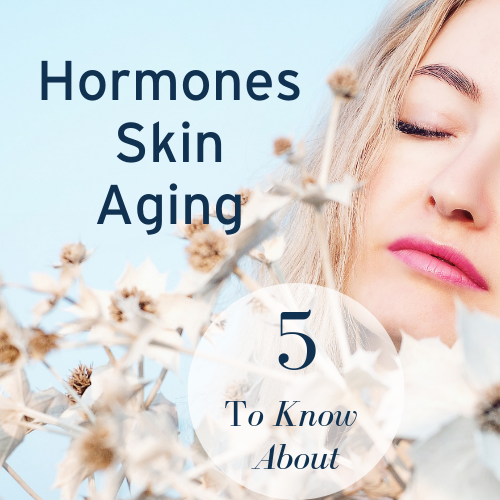Blog
Irritated Skin? Your Barrier Might Be Crying for Help
Skin suddenly acting up? Hormonal shifts can weaken your skin barrier, causing dryness, irritation, and breakouts. The fix: gentle care, deep hydration, and a simple routine to restore your glow.
Learn moreEat This Healthy Watermelon Salad All Summer Long
This easy, AND, healthy watermelon salad delivers the juicy, cooling hydration that my body craves when the temperature rises. One of the great things about this salad is that it’s soooo versatile. Eat it as a side, as a snack, an appetizer or as a main (just add in more protein). Make it vegetarian—or vegan—throw in your leftovers and call it a day! Shop All Apothekari This is a healthy watermelon salad too! Watermelon is packed with antioxidants and amino acids and also low in calories—1 cup has only 40. The pumpkin seeds (if you use) and olive oil deliver healthy fats and if you throw in some greens and a bit of protein, you’ve got a delicious full meal. Want to get our 5 top tips to help you look your best as you ride the waves of your body’s changes? Click here to get your FREE GUIDE. Healthy Watermelon Salad Ingredients (for 4 servings) 5 tsp extra-virgin olive oil 1 tablespoon fresh lemon juice 2/3 teaspoon kosher salt 3-4 cups watermelon chunks (1 1/2-inch) 2-3 tablespoons finely chopped mint leaves Optional & Substitutions (*faves) *2/3 cup crumbled feta cheese *pumpkin seeds *olives (as much as you like) ? sub basil for mint cucumbers bed of greens finely chopped jalapenos, as hot as you want *Tajin seasoning (a Mexican seasoning made with chili peppers, lime and salt. You may need to adjust seasonings above if you use this so be mindful. (I ? this over any fruit – great with mangos too!) I tend to keep this salad vegetarian but see if you like it with chicken or tuna. Let me know if you try! Directions Whisk the oil, lemon juice, salt. Drizzle dressing over the watermelon and mint. (If you’re using greens, I like to add it in this step) Top with feta, olives and any other toppings. Adjust seasoning if needed. Tip: Put the watermelon in the fridge before cubing. I find it enhances its flavor. Enjoy!
Learn more7 Reasons Why You've Got Dull Skin. Let's Get Your Glow Back
If you have dull skin, you need to know that all is not lost. Dull skin is fixable! In this post, we’re diving into why your skin is dull and sharing tips on how to get your radiant glow back. Vitamin C Matters! Vitamin C is one of the ingredients most well known to help revive dull skin into radiant, glowing skin. It is found in our skin’s outermost layers (epidermis and dermis) but it depletes as we get older. Sun damage and pollution can accelerate this decline, leading to skin that looks and feels dull, uneven and less firm. Replenish it with our Bespoke Vitamin C Serum, available in two concentrations 10% (for sensitive skin) and 15% (for normal/tolerant skin). Shop Bespoke Vitamin C 15% Shop Bespoke Vitamin C 10% Why Does My Skin Look Dull and Tired? 7 Reasons 1. You’re Drowning In Dead Skin Cells I know, ewww….You may not know it, but we shed millions of skin cells each day. Most of them just stay put at the top of our skin’s surface, acting like a fine layer of dust, leaving us with skin that looks dull and grey. The Fix? Exfoliate. Remove the dead, dry skin cells so that the new ones can shine through. Ingredients like alpha hydroxy acids and vitamin c (l-ascorbic acid) found in our Bespoke Vitamin C Serum, help to dissolve the dead skin cells, leaving you with brighter looking skin. Scrubs work too (manual exfoliation), but it’s easy to apply too much pressure so we recommend sticking with treatments (like serums) that ‘dissolve’ the skin cells instead. 2. Pollution Every time we step outside, we’re exposing our skin to polluted air, which contains dirt and gases like nitrogen dioxide, ozone, carbon monoxide and sulfur dioxide, which are harmful to skin. These can lead to the development of free radicals. Over time, free radicals damage skin, leading to wrinkles and fine lines plus pigmentation. This uneven skin tone and texture, diffuses light and leaving skin looking dull. The Fix? Wash your face every night to remove dirt and makeup, which can damage skin while you sleep. 3. You’re Stressed Out Stress is inevitable for most of us. It has an impact on our overall wellness and also on our skin. Prolonged stress not only makes you more tired over time, it also impacts the levels of the stress hormone cortisol, along with adrenaline. Increased levels of these hormones caus our heart rate to go up, our blood pressure to rise and sugar to accumulate in our bloodstream. Cortisol increases oil production, leading to acne or sensitive skin. Plus, its presence can increase the break down of skin components like collagen and elastin leading to wrinkles, lines and you got it, dull skin. The Fix? Getting stress under control will help, so try to do that as much as you can. When it comes to your skin, focus on gentle cleansing (our Cloud Nine Foaming Cleansing Crème is a great option) along with moisturizers and treatments rich in antioxidants, and other skin nourishing ingredients to help combat the impact of stress. 4. Blame Your Hormones Fluctuating hormone levels, like those we experience through puberty and menopause, can affect our skin’s appearance. Beyond acne and blemishes, menopause leads to a dip in estrogen levels, which can result in skin that’s drier, leaving it looking dull and lackluster. The Fix? Switch to more hydrating moisturizers and and apply them more often if needed. Consider adding in oils like our Antioxidant Face Oil. Also, lifestyle changes can help to help combat the dryness. More in this post. 5. Your Skin is Dehydrated Without enough hydration, dull skin often follows. Moisture helps to plump up skin cells, leaving them looking more radiant. This isn’t about drinking more water, because increased water consumption can’t make it’s way to dry skin. The Fix? Topical treatments that contain both humectants (like glycerin and hyaluronic acid), attract moisture into skin and emollients (like plant oils or fatty alcohols), soften skin, leaving skin looking less dry and dull. If your skin is particularly dry, add in occlusives (like lanolin, oils and butters) to trap in moisture. 6. Choose Your Drinks Carefully Alcohol and caffeine are dehydrating and can lead to skin that is dry and dull. The Fix? Enjoy them in moderation, swapping out for herbal teas, and non-alcoholic or low alcohol alternatives when you can. 7. Skipping out on Sunscreen UV rays are one of the biggest causes of skin damage. Over time, unprotected exposure to the sun’s rays can damage your skin’s protective barrier, leaving skin looking tired, dark and dull. The Fix? This one’s pretty straightforward – wear your sunscreen every day! What Products Are Good for Dull Skin? If the solutions above weren’t enough, consider the following: 1. Add a Serum to Your Routine Serums are often formulated with high concentrations of active ingredients to help brighten, boost hydration and diminish the signs of aging. Vitamin C serums brighten skin tone, while retinoids help to boost collagen production, pushing away old skin cells and allowing fresh, new ones to come to the surface. There are many forms of vitamin C to choose from – all are great antioxidants but have different effects. L-ascorbic acid has the most skin-related research of any form of vitamin C. Other beneficial forms supported by research include tetrahexyldecyl ascorbate, sodium ascorbyl phosphate, ascorbyl palmitate, magnesium ascorbyl phosphate, ascorbyl palmitate and ascorbyl glucoside. 2. Ditch the Aggressive Cleansers Avoid harsh scrubs and drying soaps, which can irritate skin leaving it looking red, tight and flaky. 3. Stick With Lukewarm Water Hot water can strip away natural oils, disrupting the skin’s protective barrier and leaving it open to dryness (hello dullness) and irritation. 4. Consider a Procedure Topical treatments and lifestyle changes can go a long way but sometimes you may need a bit more help from your dermatologist. Check in with one if you need more help.
Learn moreThis Is How to Emerge With Glowing Skin
Glowing skin may be something most of us aspire to, but it’s probably not top of mind right now. We can’t really change what’s going on around us, but, we do have control over how we spend our time. Here at Apothekari, we’re taking time to learn new things, catch up on our reading & engage in some self-care, including taking better care of our skin. These are things we definitely won’t regret when we’re allowed to emerge back into society again! In this post, we’re diving into how vitamin C, found in our Bespoke Vitamin C Serum, helps to deliver youthful and glowing skin. Shop Bespoke Vitamin C 15% Fade Dark Spots For Glowing Skin A powerhouse skincare ingredient, vitamin C interrupts the process that leads to the formation of melanin, which is responsible for skin discoloration like dark spots. Incorporating it into your skincare routine on a regular basis can help to prevent them from forming in the first place AND help to fade them, without altering your skin’s normal coloring. Exfoliate for the Glow In addition to helping prevent dark spots from forming in the first place, L-ascorbic acid, the form of vitamin C found in our Bespoke Vitamin C Serum, can also help to remove them. L-ascorbic acid is a mild exfoliant and works to lift away the discolored dead cells that sit on our skin’s surface. The result? Clearer, more evenly toned and glowing skin, in as little as a few days. Free Radical Damage Control Vitamin C belongs to a class of ingredients known as antioxidants, compounds that help to protect skin from harm caused by free radicals. Daily exposure from things like the sun, pollution and smoke, all trigger the formation of free radicals, unstable molecules that can damage skin cells leaving it looking dull and lifeless – the opposite of glowing skin! Glowing Skin & More! Vitamin C also stimulates collagen production, helping to keep skin looking firmer; is anti-inflammatory, helping to even out the redness associated with rosacea and it can also help skin to heal faster. We use L-ascorbic acid in our Bespoke Vitamin C Serum because it’s the form of vitamin C with the most research to back up its skin benefits. It’s combined with other antioxidants, including ferulic acid and vitamin E, which increase its ability to protect against sun damage. Apply it every morning under your sunscreen and get ready for beautiful, healthy and glowing skin!
Learn moreHormones, Skin & Aging: 5 Hormones You’ll Want to Know About
As you get older, you may be wondering about the connection between hormones, skin and overall wellness. And while there’s more talk about the topic these days, it’s still important to understand the intricate relationship between hormones and your skin’s health. So, let’s get to it! Shop All Apothekari Can Hormone Imbalance Cause Skin Problems? As we get closer to perimenopause and menopause, the hormone balance starts to change so you may start to notice a difference in the way your skin looks and feels. Hormones are chemical messengers, which tells cells–including skin cells–what to do. So when their balance is upset, you may very well notice a difference in your skin’s complexion. How Do Hormones Affect the Skin? There are many hormones in the human body and each play different roles when it comes to your health. In this post, we’re looking at five key players: estrogen, progesterone, cortisol, insulin, and testosterone, that can have an impact on your skin. Each one plays a unique role, but it’s also important to appreciate that they can have combined impact on your skin. Estrogen and Skin Aging. Our leading lady, estrogen, orchestrates the stages of puberty, pregnancy preparation, and overall skin vitality. However, estrogen gracefully takes a step back as we get older, leading to dryness and leaving our skin looking older. Stress and insufficient sleep–two factors that often come into play during the menopause transition–also influence estrogen production, which can impact the skin’s aging process. Progesterone and Skin Elasticity. Enter progesterone, the hormone which helps to enhance skin elasticity and blood circulation, ensuring that skin stays nourished. Yet, as time marches on, progesterone also starts to decline, leaving your skin looking lackluster. Menopause, stress, and health conditions all have the potential to disrupt the production of progesterone, and which can contribute to changes in skin texture. Cortisol: The Stress Hormone. Meet cortisol, often referred to as “stress hormone”, and which wreaks havoc not only on our mental state, but also can stage an aging performance on your skin. Studies reveal that stress-induced collagen loss, can lead to skin sagging, thinning and dullness, all resulting in a less vibrant complexion. Stress management is not only a wellness mantra; it’s also a crucial skincare strategy. Insulin and Skin Health. You may not think that insulin has much impact on how your skin looks, but it absolutely has an impact. Released in response to sugar consumption, insulin regulates blood sugar levels. High glycemic foods–you know, those cookies, donuts and sugary treats that many of us crave–might trigger insulin spikes, potentially impacting sleep and contributing to skin wrinkling. A gentle reminder that even our diet influences skin well-being. Testosterone and Skin Troubles. Whether in women or men, an abundance of testosterone might lead to unwanted acne. Aging introduces a double-whammy twist–women experience an increase in testosterone, which can bring about an increase in breakouts, while also experiencing a decrease in estrogen, resulting in drier skin. Does Balancing Hormones Help Skin? It makes sense that balanced hormones would be just the remedy that picky skin would benefit from. However, this is still a controversial topic in the field of medicine. If you feel that it’s something that you want to explore, check in with your doctor to discuss options and whether it makes sense for you. How Can I Balance My Hormones for Clear Skin? While your hormone levels can be up, down and all over the place as you get older, especially during the menopause transition, you can influence their levels to some extent. Focus on prioritizing good nutrition, stress management, regular exercise, and sufficient sleep. These will not only benefit your overall wellness, but your skin’s health as well. Which Hormone is Responsible for Glowing Skin? In our pursuit of radiant skin, we can’t overlook an unsung hero–melatonin. Produced in both your brain and skin cells, melatonin regulates sleep-wake cycles and acts as a potent antioxidant, helping to protect our skin against damage caused by free radicals. Studies regarding the use of topical melatonin are mixed as the hormone has been implicated in skin darkening because it activates melanocytes, the skin’s pigment cells. If you want to supplement with melatonin it’s best to take it internally rather than applied topically. While topical melatonin studies yield mixed results, internal supplementation is recommended for its potential benefits. What Hormone Causes Bad Skin? Identifying the culprit behind problematic skin brings us back to excessive testosterone. Whether in women or men, an abundance of testosterone might lead to unwanted acne. Your body deserves a thoughtful approach. Aging is inevitable and with it, comes many changes–those you can see and some that you can’t. When it comes to your skin, there are many safe and effective products that you can use to help combat the impact of changing hormone levels. Consider our Radiant Skin Set or our Ageless Skin Set, which are a great way to get you started on a skincare routine that can make a difference. And if you’re still not sure what to do, consult with your doctor or pharmacist. Aging doesn’t have to mean the loss of healthy and beautiful skin. Ask for help if you need it.
Learn more





